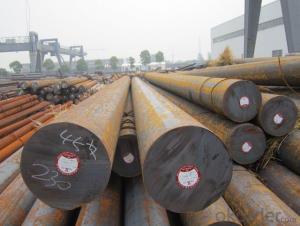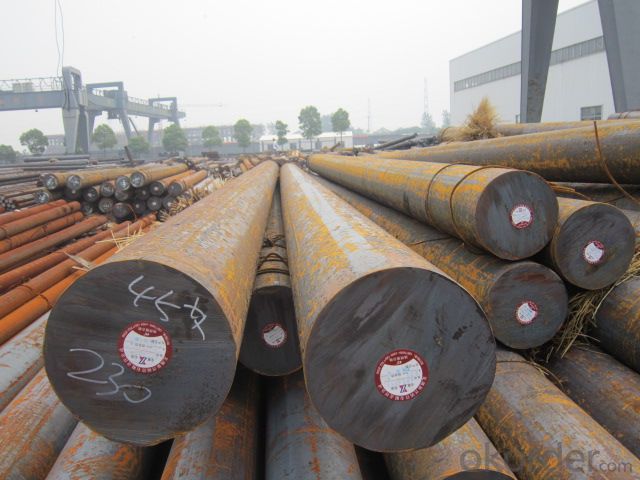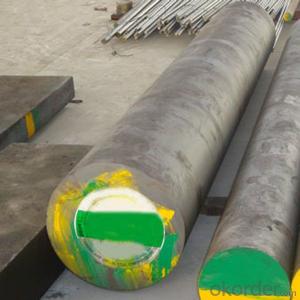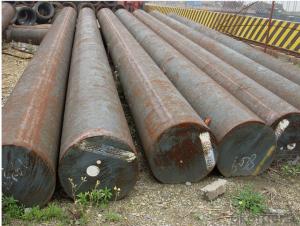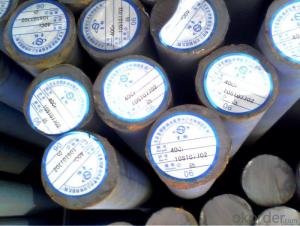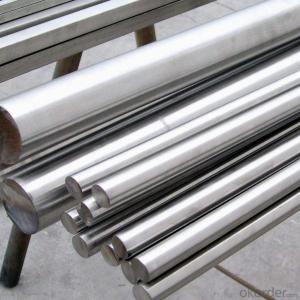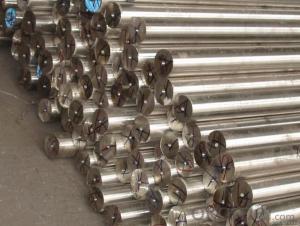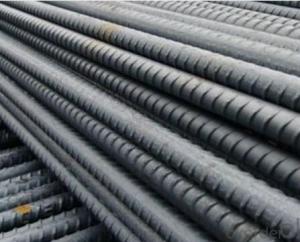Special Steel 6150 Steel/6150 Steel Round Bar/Tool Steel 6150
- Loading Port:
- China main port
- Payment Terms:
- TT OR LC
- Min Order Qty:
- 25 m.t.
- Supply Capability:
- 10000 m.t./month
OKorder Service Pledge
OKorder Financial Service
You Might Also Like
Specification
The details of our Steel
1. Produce Standard: as the GB, AISI, ASTM, SAE, EN, BS, DIN, JIS Industry Standard
2. Produce processes: Smelt Iron -EAF smelt Billet - ESR smelt Billet -Hot rolled or forged get the steel round bar and plate
3. Heat treatment:
Normalized / Annealed / Quenched+Tempered
4. Quality assurance:
All order we can received Third party inspection, You can let SGS, BV,.. and others test company test and inspect our products before Goods shipping.
Product information
1.Specification of 6150 steel | |||||||||||||
Round bar | Diameter(mm) | Length (mm) | |||||||||||
10~300 | 2000~5800 | ||||||||||||
Plate | Thickness(mm) | Width (mm) | Length (mm) | ||||||||||
20~70 | 105~610 | 2000~5800 | |||||||||||
The specification can be customised! | |||||||||||||
2.Chemical compositon of 6150 steel | |||||||||||||
NO. | C | Mn | Si | Cr | V | Ni | P | S | |||||
Aisi 6150 steel | 0.5 | 0.7 | 0.3 | 1.00 | 0.15 | ≤0.25 | ≤0.025 | ≤0.025 | |||||
3. Mechanical properties of 6150 steel | |||||||||||||
Tensile str. (N/mm2) | Yield point (N/mm2)
| Elongation (%) | Hardness | ||||||||||
≥1372(140) | ≥1225(125) | ≥5 | ≤321HB | ||||||||||
4.Heat treatment of 6150 steel | |||||||||||||
1. Normalizing: 830 ~ 860C - air cooling - HBS less than 302 | |||||||||||||
2. Annealing: 750C - furnace cooling - HBS less than 222 | |||||||||||||
3. Quenching: 850C oil HRC>61 | |||||||||||||
4. HRC after tempering: 150C 61,200 C - 60,300 C - 56,400 C - 51, 500 C - 43,550 C - 38,600 C - 33,650 C – 29 | |||||||||||||
5.Characteristic of 6150 steel | |||||||||||||
(1) high toughness and strength | |||||||||||||
(2) high hardnenability | |||||||||||||
(3) good antifatigue property | |||||||||||||
(4) excellent mechanical property | |||||||||||||
6.Application of 6150 steel | |||||||||||||
(1) Spring steel for gas engine, car within 200°C | |||||||||||||
(2) hardness after annealing ≤255HBS | |||||||||||||
Main product
High speed steel | |
AISI | M2,M4,M35,M42,T1 |
DIN | 1.3343,1.3243,1.3247,1.3355 |
JIS | SKH51,SKH54,SKH35,SKH59,SKH2 |
Cold work tool steel | |
AISI | D2,D5,D3,D6,A8,A2,O1 |
DIN | 1.2379,1.2601,1.2080,1.2436,1.2631,1.2363,1.2510,1.2327 |
JIS | SKD10,SKD11,SKD1,SKS3 |
Hot work tool steel | |
AISI | H13,H11,H21 |
DIN | 1.2344,1.2343,1.2367,1.2581,1.2713 |
JIS | SKD61,SKD6,SKD7,SKD5SKT4 |
Plastic mould steel | |
AISI | P20,P20+Ni,420 |
DIN | 1.2311,1.2738,1.2083,1.2316 |
JIS | PDS-3,SUS420J1,SUS420J2 |
Alloy structural seel | |
AISI | 5140,4340,4135,4140 |
DIN | 1.7035,1.6511,1.7220,1.7225 |
JIS | SCr440,SNCM439,SCM435,SCM440 |
Stainless steel | |
AISI | 440C,420,430 |
DIN | 1.4125 |
JIS | SUS440C |
Carbon steel | |
AISI | 1045,1020 |
DIN | 1.1191 |
JIS | S45C, G3101 |
Product show

Workshop show

Shipping
1. FedEx/DHL/UPS/TNT for samples, Door-to-Door;
2. By Air or by Sea for batch goods, for FCL; Airport/ Port receiving;
3. Customers specifying freight forwarders or negotiable shipping methods!
Delivery Time: 3-7 days for samples; 5-25 days for batch goods.
Payment Terms
1.Payment: T/T, L/C, Western Union, MoneyGram,PayPal; 30% deposits; 70% balance before delivery.
2.MOQ: 1pcs
3.Warranty : 3 years
4.Package Informations: 1) EXPORT, In 20 feet (GW 25 ton) or 40 feet Container (GW 25 ton)
2)as customer's requirement
Why choose us?
(1) The leading exporter in China special steel industry.
(2) Large stocks for various sizes, fast delivery date.
(3) Good business relationship with China famous factories.
(4) More than 7 years steel exporting experience.
(5) Good after-sales service guarantee.
- Q: How is special steel used in the packaging supply chain?
- Special steel is used in the packaging supply chain for various purposes such as manufacturing machinery, tools, and equipment needed for packaging processes. It is used to create durable and reliable components like blades, cutters, and molds, ensuring precise and efficient packaging operations. Additionally, special steel can be utilized for constructing robust packaging materials like containers, pallets, and racks, providing strength and stability during transportation and storage.
- Q: What are the environmental impacts of producing special steel?
- The production of special steel can have several environmental impacts. Firstly, the extraction of raw materials, such as iron ore and coal, can lead to habitat destruction and soil erosion. Additionally, the energy-intensive processes involved in steel production, such as smelting and refining, contribute to greenhouse gas emissions, air pollution, and climate change. Moreover, the disposal of waste materials, including slag and dust, can contaminate water sources and harm aquatic life. It is crucial to implement sustainable practices and technologies to mitigate these environmental impacts and ensure responsible steel production.
- Q: How does special steel contribute to the metalworking industry?
- Special steel plays a crucial role in the metalworking industry by providing enhanced properties and performance that regular steel cannot achieve. It contributes to the industry in several ways: 1. Improved Strength and Durability: Special steel is manufactured with specific alloys and composition, making it stronger and more durable than regular steel. This enables it to withstand high temperatures, heavy loads, and extreme environments, making it ideal for applications in industries such as aerospace, automotive, and construction. 2. Enhanced Corrosion Resistance: Special steel is often designed to have superior resistance to corrosion compared to regular steel. This makes it highly suitable for applications in marine, chemical, and oil and gas industries, where exposure to harsh environments and corrosive elements is common. 3. Increased Hardness and Wear Resistance: Special steel can be engineered to have higher hardness and wear resistance, making it ideal for manufacturing cutting tools, dies, molds, and other components that require prolonged usage and resistance to wear and tear. This contributes to increased productivity and efficiency in metalworking processes. 4. Precision Machining: Special steel offers excellent machinability, allowing for precise shaping, drilling, and cutting. This enables manufacturers to create complex and intricate designs with ease, resulting in high-quality finished products and components. 5. Customization and Flexibility: Special steel can be tailored to meet specific requirements, allowing for customization and flexibility in design and application. Manufacturers can choose from a wide range of special steel grades, each with its unique properties, to suit their specific needs. Overall, special steel significantly contributes to the metalworking industry by providing enhanced strength, durability, corrosion resistance, hardness, wear resistance, machinability, and customization options. It enables the industry to manufacture high-quality products, improve efficiency, and meet the demanding requirements of various sectors.
- Q: How does special steel contribute to improving product performance?
- Special steel contributes to improving product performance in several ways. Firstly, it offers enhanced strength and durability, making it suitable for applications that require high load-bearing capacities. Secondly, special steel has excellent corrosion resistance, ensuring products remain intact and functional even in harsh environments. Additionally, special steel can be tailored to have specific properties like heat resistance, hardness, or flexibility, allowing manufacturers to design and produce products with superior performance characteristics. Overall, the use of special steel in manufacturing leads to more reliable and efficient products, ultimately enhancing their overall performance.
- Q: How does special steel contribute to the mining machinery industry?
- Special steel plays a crucial role in the mining machinery industry by offering exceptional strength, durability, and resistance to wear and corrosion. This type of steel is specifically engineered to withstand the harsh and demanding conditions that are typically encountered in mining operations. In the mining machinery industry, equipment such as drills, excavators, loaders, crushers, and conveyor systems are subjected to extreme stress, heavy loads, and abrasive materials. Special steel components can be found in various parts of these machines, including buckets, tracks, cutting edges, gears, and hydraulic components. The high strength and toughness of special steel ensure that mining machinery can withstand the immense forces and impacts involved in excavation, hauling, and processing of minerals. This durability helps to extend the lifespan of the equipment, reducing the need for frequent replacements and minimizing downtime, which ultimately leads to cost savings for mining companies. Moreover, special steel's resistance to wear and corrosion is vital in the mining industry. The presence of abrasive materials and corrosive substances in the mining environment can lead to rapid deterioration of machinery components. However, special steel alloys are designed to resist wear and corrosion, thereby enhancing the longevity and performance of mining machinery. Additionally, special steel enables mining machinery to operate efficiently and effectively. Its high strength-to-weight ratio allows for the construction of lightweight yet robust equipment, improving mobility and productivity in mining operations. The use of special steel also enables the design of complex components with intricate shapes, ensuring optimal functionality and performance. Overall, special steel is an indispensable material in the mining machinery industry. Its exceptional strength, durability, resistance to wear and corrosion, and ability to enhance efficiency make it a vital component in the design and construction of mining equipment. By incorporating special steel, mining machinery can withstand the harsh conditions and heavy-duty tasks involved in mining operations, ultimately contributing to increased productivity, reduced costs, and improved safety in the industry.
- Q: How is alloy steel different from carbon steel?
- Alloy steel is different from carbon steel because it is made by adding other elements to carbon steel, such as chromium, nickel, or manganese, to enhance its properties. This makes alloy steel stronger, more resistant to corrosion, and better suited for specific applications compared to carbon steel, which is primarily composed of iron and carbon.
- Q: What are the advancements and trends in the field of special steel?
- In recent years, there have been significant advancements and emerging trends in the field of special steel. One major advancement is the development of high-strength and high-performance alloys, which offer improved mechanical properties and resistance to wear, corrosion, and extreme temperatures. Additionally, there has been a focus on the production of special steel with enhanced sustainability and reduced carbon footprint, in response to growing environmental concerns. Another trend is the increasing use of special steel in additive manufacturing or 3D printing, allowing for the creation of complex and customized components. Furthermore, the integration of digital technologies and automation in steel production processes has improved efficiency, quality control, and overall productivity. These advancements and trends in special steel continue to drive innovation and expand its applications across various industries, such as automotive, aerospace, energy, and construction.
- Q: What are the properties of duplex stainless steel?
- Duplex stainless steel is a type of stainless steel that possesses a unique combination of properties. It is highly corrosion resistant, making it suitable for use in aggressive environments, such as those containing chlorides or acids. It also exhibits excellent strength and toughness, allowing it to withstand high pressures and temperatures. Additionally, duplex stainless steel has good weldability and formability, making it versatile for various fabrication processes. Its dual-phase microstructure provides a balance of ferrite and austenite, resulting in improved resistance to stress corrosion cracking and higher resistance to pitting and crevice corrosion compared to other types of stainless steel.
- Q: How does nitriding steel improve hardness and wear resistance?
- Nitriding steel improves hardness and wear resistance by introducing nitrogen into the steel's surface through a heat treatment process. This forms nitrides, which are hard compounds that increase the material's surface hardness. Additionally, the nitrogen atoms create compressive stresses within the structure, enhancing the material's resistance to wear and fatigue.
- Q: How does special steel contribute to the medical field?
- Special steel plays a crucial role in the medical field by providing the necessary strength, durability, and corrosion resistance required for various medical instruments and implants. It enables the manufacturing of surgical tools, such as scalpels, forceps, and bone drills, that can maintain their sharpness and withstand repeated sterilization. Moreover, special steel alloys, like stainless steel, are used in the production of implants, prosthetics, and orthopedic devices due to their biocompatibility, strength, and resistance to body fluids. Overall, special steel ensures the reliability and effectiveness of medical equipment, enhancing patient care and surgical outcomes.
Send your message to us
Special Steel 6150 Steel/6150 Steel Round Bar/Tool Steel 6150
- Loading Port:
- China main port
- Payment Terms:
- TT OR LC
- Min Order Qty:
- 25 m.t.
- Supply Capability:
- 10000 m.t./month
OKorder Service Pledge
OKorder Financial Service
Similar products
Hot products
Hot Searches
Related keywords
